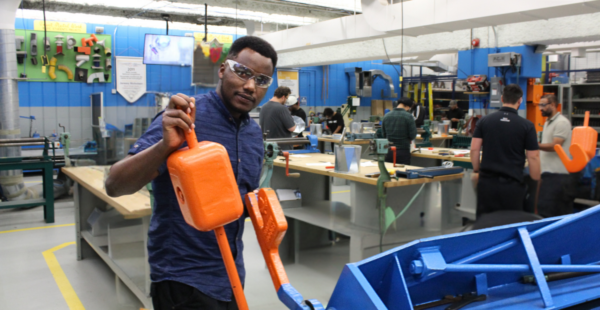For the first time in recent history, Canada has more people over the age of 65 than under the age of 15.
Toronto, while younger than most parts of Canada, is not immune to these ageing demographics. Yet, as the city’s population age increases, so too have the unemployment and labour market challenges faced by older workers.

In 2017, WoodGreen Community Services held a series of focus groups to gain insights on the experiences of over 50 mature job seekers 50 years of age and older from across the Greater Toronto Region. Findings from these focus groups exposed the increasing challenges mature workers in the region face while job searching, including,
- receiving fewer job offers once unemployed;
- facing significantly longer periods of unemployment; and
- needing to have a stronger reliance on Ontario Works (i.e. social assistance) compared to their younger counterparts.
The impacts of COVID-19 have assuredly exacerbated many of these challenges.
While youth unemployment has captured the imagination and attention of local and federal policymakers on the road to COVID-19 economic recovery, the ongoing challenges faced by older workers have largely gone unnoticed.
Recognizing this gap in targeted policy interventions, WoodGreen decided to test a new approach for older workers focused on training tools and practices customized to the needs of older job seekers. Here’s what we found.
CUSTOMIZED TRAINING IS KEY
In September 2020, WoodGreen introduced an innovative new pilot training program, called the Older Workers’ Initiative (OWI), which aimed to improve access to sustainable employment — using customized training — for 14 job seekers aged 45 years and up, who had been unemployed for over a year and on Ontario Works.
 Strong man working in a steel factory workshop
Strong man working in a steel factory workshop
Funded by the Toronto Employment and Social Services (TESS), and designed in collaboration with the Retail Council of Canada (RCC), the six-week training program (which was followed by a six-week retail job placement) featured innovative tools and practices catered to the needs of older job seekers. It also used customized tools like experiential learning, such as simulated workplace activities and peer-to-peer learning.
By working with job placement employers and the RCC, WoodGreen was also able to ensure that participants were equipped with the specific skills they would need on the job.
Though the program had to pivot online at the height of the pandemic, over 90% of participants indicated they felt more confident about their employment future and income, and almost all participants noted that the program’s personalized skills content met or exceeded their expectations.
THE FUTURE POTENTIAL OF CUSTOMIZED TRAINING FOR OLDER WORKERS
With support from the Ontario Human Capital and Research Innovation Fund (OHCRIF), WoodGreen conducted a full evaluation of the program to illustrate the program’s impacts and future potential. Details on the evaluation and next steps for the program can be found in our latest report, Improving Opportunities & Outcomes for Toronto’s Older Job Seekers.
Overall, both participants and program organizers felt that the program was a success. This indicates the future potential of customized training for older workers and other population groups in need of labour market support. Several important learnings gathered from the program’s first year showed that
- age-based programming noticeably improved older job seeker confidence;
- cohort-based programming expanded participants’ social networks; and
- virtual programming enhanced participants’ digital skills.
The rapid aging of Toronto’s population is a signal that the design and testing of new and innovative employment interventions for older job seekers is urgently needed.
WoodGreen is eager to continue testing new approaches, like customized training, to ensure we are building resilience for our clients to thrive in the labour market of today and of the future.
The Older Workers’ Initiative project evaluation is funded in part by the Government of Canada and the Government of Ontario. The Government of Ontario and its agencies are in no way bound by any recommendations contained in the project report.





